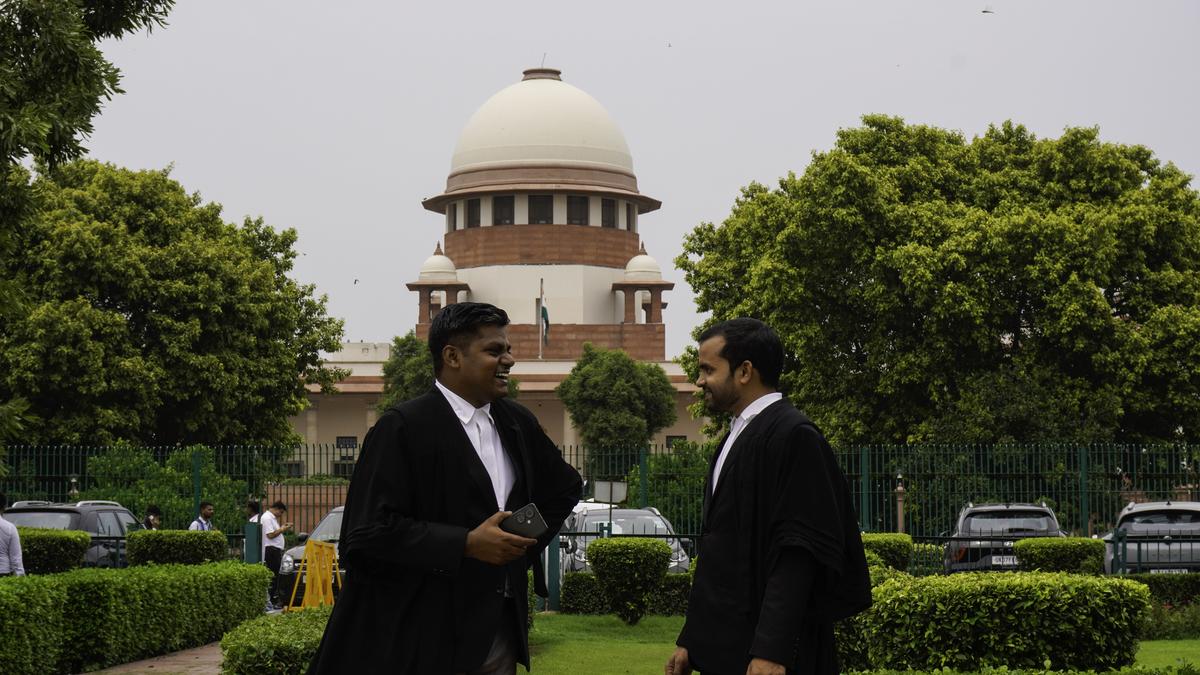
At a time when majoritarianism often rests on electoral frauds, courts across the world face newer challenges, both jurisprudential and political. File.
| Photo Credit: The Hindu
At least a few from the ruling dispensation have asked why the Opposition is not formally taking up the electoral roll issue before the Supreme Court. However, the reluctance shown by the major Opposition parties is quite reasonable and even justifiable.
The Modi regime promulgated the Chief Election Commissioner and Other Election Commissioners (Appointment, Conditions of Service and Term of Office) Act in 2023 with a view to nullify the Constitution Bench judgment in Anoop Baranwal v. Union of India (2023). The Act excluded the Chief Justice of India (CJI) and included a Cabinet Minister to be nominated by the Prime Minister in his place, as part of the Selection Committee for choosing the Election Commission of India (ECI). This statute was legally challenged in several writ petitions which are yet to be finally heard. Significantly, the petitioners also sought a stay of the enactment. A Bench, led by Justice Sanjiv Khanna (as he then was), heard the application for a stay and rejected it on March 22, 2024, by a detailed order in Dr. Jaya Thakur and others v. Union of India (2024). Had the statute been stayed, the country could have had a different umpire for the 2024 Lok Sabha elections and the subsequent Assembly elections. In all probability, a more independent ECI could have had the potential to conduct the elections more fairly and impartially. That this did not happen shows the Supreme Court’s failure to act at a time when it was supposed to.
Also read: What are the challenges confronting the EC? | Explained
The present type of ECI
In Anoop Baranwal, the Constitution Bench analysed Article 324 of the Constitution dealing with the appointment of Election Commissioners. It spoke of the need to take the appointment “out of the exclusive hands of the executive”. It said that “a pliable ECI, an unfair and biased overseer of the foundational exercise of adult franchise, which lies at the heart of democracy, who obliges the powers that be, perhaps offers the surest gateway to acquisition and retention of power”. The Court was assertive when it said that “the outpouring of demands for an impartial mode of appointment of the members require, at the least, the banishing of the impression that the ECI is appointed by less than fair means”. This shows the rationale behind prescribing the CJI as a member of the Selection Committee for the ECI.
Yet, a few months later, the Centre ensured that only “persons under the thumb of the executive”, as feared by Dr. B.R. Ambedkar, dominate the Selection Committee. When this was shown to the Supreme Court, it took a very conservative and dangerous stand, saying it won’t interfere with a statute for it carries a “presumption of validity”. This is how the present type of ECI was allowed to function.
At a time when majoritarianism often rests on electoral frauds, courts across the world face newer challenges, both jurisprudential and political. In a paper titled ‘Abusive Judicial Review: Courts Against Democracy’ (2020), David Landau and Rosalind Dixon have conducted an extensive global survey on the topic. According to them, “courts have upheld and thus legitimated regime actions that helped actors consolidate power, undermine the Opposition, and tilt the electoral playing field heavily in their favour”. They explain that sometimes “(the) clever authoritarians often do their manipulation well before elections have actually been held, by consolidating power, stacking key institutions such as courts and electoral commissions, and harassing Opposition parties and leaders”. The paper says courts in countries such as Venezuela, Ecuador, and Bolivia aided and facilitated electoral frauds which ensured continuation of autocracies. On the other hand, there are few instances where the courts could prevent electoral manipulation and the consequent subversion of democracy. The judgment in Baranwal exemplifies such judicial vigilance.

Fourth branch institutions
Article 324 failed to prescribe a body free from the ruling executive for installing the ECI. Modern Constitutions have reorganised the need to evolve fourth Branch institutions (in addition to the executive, the legislature, and the judiciary) which are autonomous and independent of the ruling dispensation. The Constitution of South Africa envisages a cluster of state institutions for “supporting constitutional democracy”. The Chapter Nine institutions, as they are called, include the Electoral Commission of South Africa. The silence of the Indian Constitution prompted the Court in Baranwal to prescribe a fairer body for choosing the ECI. It was an instance of imaginative interpretation of the relevant constitutional provision. However, Parliament failed the Court and the people when it enacted the 2023 Act. The Court’s refusal to stay the enactment practically nullified its own hard labour and intelligence in redefining the ECI as an independent fourth branch establishment.
In India, electoral manipulation, as alleged by the Opposition, would call for a deeper and comprehensive analysis by a fair agency. The Court, on its own, will not be able to carry out this exercise. The only way to rescue our democracy would be to restore the position laid down in the Baranwal verdict and to nullify the 2023 enactment. A Selection Committee with the CJI in it will have to induct another ECI by way of a fresh selection process. Such an ECI will have to act as a Truth Commission to investigate the alleged instances of electoral scam. The courtesy expected from the present dispensation would be to facilitate such a course by removing the present ECI.
Published – August 18, 2025 12:15 am IST
